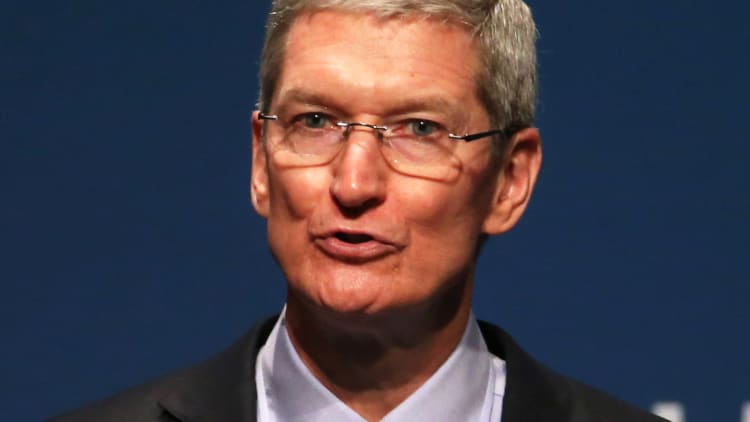
In loudly criticizing the data-collecting practices of Silicon Valley Internet companies, Apple CEO Tim Cook is lashing out at some of his most valuable content providers.
Half of the 10 most popular free apps on the iPhone are owned by Google or Facebook. Those services are free because they're ad-supported. They help drive iPhone sales, and the iPhone accounts for more than half of Apple's revenue.
Cook didn't name names, but when he said companies "have built their businesses by lulling their customers into complacency about their personal information," he wasn't leaving much to the imagination. And in saying, "That's not the kind of company that Apple wants to be," he has that luxury because other businesses are doing it for him.
Read MoreApple CEO's fiery words on competition
"He's the enabler and he's the beneficiary," said Maha Ibrahim, a general partner at venture firm Canaan Partners in Menlo Park, California. "He's just not getting his hands dirty."
Cook spoke Monday night at an event sponsored by the Electronic Privacy Information Center and covered by TechCrunch. It came nine months after the Apple CEO wrote an open letter explaining that the company doesn't monetize consumer data and doesn't create a "profile based on your email content or Web browsing habits to sell to advertisers."
Cook is tapping into a sensitive issue. The privacy topic entered the mainstream in 2013, after Edward Snowden leaked classified information detailing how U.S. companies cooperate with the National Security Agency in handing over user data.

Meanwhile, Google and Facebook are getting ever more powerful, pulling consumers into more services on more devices and connecting our experiences through personal credentials. All that activity and engagement means ad dollars for Google and Facebook, which own a combined 48 percent of the U.S. digital ad market, according to eMarketer.
"Tim has put down the first domino down on a conversation that the industry has to have about ethical data use," said Susan Etlinger, an analyst at industry research firm Altimeter Group.
Representatives from Facebook, Google and Apple declined to comment.
While the Internet giants are the obvious targets, other popular ad-supported apps on the iPhone include Twitter, Pandora and Pinterest. Cook's comments suggest that he has a big problem with the uses of data, but he's also taking a swipe at ad-supported business models, versus the Apple model of selling products.
Read MoreFacebook most feared tech company: Survey
Etlinger said the conversation has to extend beyond ad-based services and include connected devices like Fitbit activity trackers. As data get more personal, consumers need more transparency on how the information being used.
"Part of the experience is in the physical object, but a good bit of it is in data," she said. "If that doesn't feel like a fair exchange of value, they won't use those devices."
In the speech, Cook specifically called out mining of online search, email and photos, with the data being "sold off for god knows what advertising purpose." Google just last week introduced a new free service for storing unlimited photos and videos in the cloud.
Evernote CEO Phil Libin is rallying behind Cook's comments, tweeting on Wednesday that he totally agrees with Apple's position on "privacy, security, encryption and advertising."
Chamath Palihapitiya, a former Facebook executive and now a venture capitalist at Social+Capital Partnership, sees Cook getting particularly aggressive toward Google because it's a direct competitor.
Cook wants to make clear that when consumers choose Android devices over iPhones and iPads, they have no idea how their personal information will be used, Palihapitiya said.
"He sees them trying to encroach onto his territory as a platform maker," Palihapitiya said. "He's trying to contain everybody into their own boxes."


